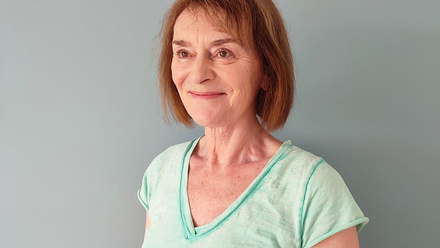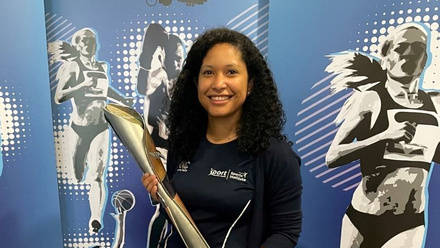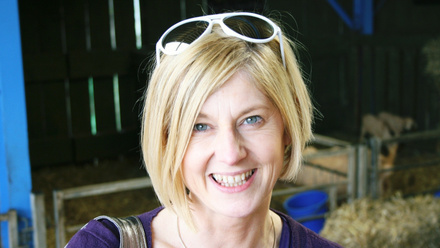In January, Dietitian Sarah-Jane Mattinson decided to take a leap of faith and leave behind her role in Oxford for a three-year placement on the island of St Helena in the South Atlantic. She shares her experiences so far.
You may well ask how an Intestinal Rehabilitation Dietitian ends up on a remote South Atlantic island 4,000 miles away from home and what skillset she brings to the island of St Helena?
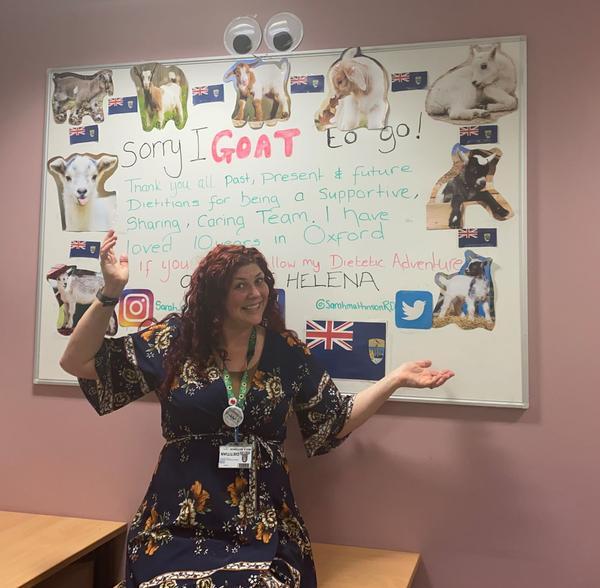
Let me introduce you to the island first.
St Helena is best known as the location of Napoleon’s final exile after the battle of Waterloo. Or for its eldest resident, Jonathan, the 190-year-old giant tortoise, who arrived from Seychelles in 1882. Jonathan is recognised as the world’s oldest animal by the Guinness Book of World Records. This island is a British Overseas Territory, only accessible by bi-weekly flights and a three-weekly visit from the good ship M.V Helena, which brings supplies and food to the island. This is a small volcanic, sub-tropical island that can see all weather conditions from heavy rain to bright sunshine within a few hours. I am reliably informed it’s never snowed here though. So welcome to St Helena, my home for the next three years!
Making a difference to people’s quality and length of life has always been at the heart of work I do. I want to make a positive impact for as many people as possible. For years I saw students and colleagues come to work in Oxford from all over the world. I was always in awe at the courage it must take to be that intrepid and confident. Dare I say - I was embarrassed I had only ever lived and worked in Oxfordshire. So I decided it was time for a change. One internet search, a click of a mouse and press of a button later, my application was on its way to the St Helena Government with the blessing of my two amazing daughters and support from my long-suffering husband. Six months later and with a handful of training courses behind me, I am in the middle of the South Atlantic!
There has not been a dietitian on the island for three years and there were no dietetic services retained. The 2021 figures suggest about 4,500 people live on St Helena. Current information indicates that 70% of adults are living with overweight or obesity, with approximately 1,000 living with type 2 diabetes. There are nearly 400 pre-diabetics on the island. Anecdotally figures indicate that nearly half the diabetic population have diagnosed hypertension and a large number of people are living with chronic kidney disease.
The cost of living is high. The internet is a privilege; if you want 31GB of data it will cost £180 per month. The average salary on the island is £8,800 per year, yet the cost of food can be up to four times more expensive than the UK. No doubt current world events will have a massive impact on the cost of imported goods.
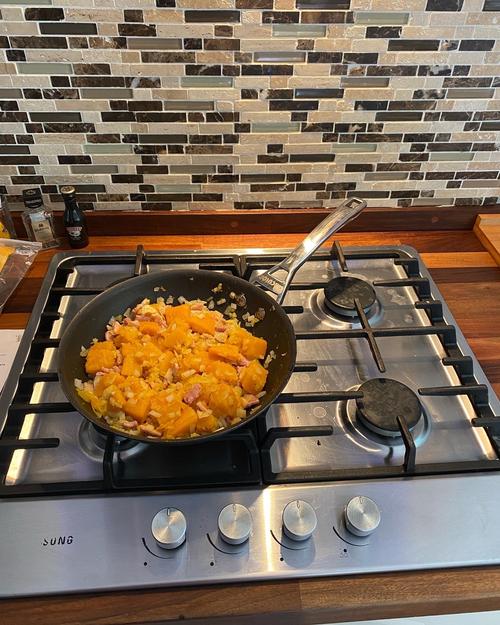
The supply chain is very brittle. Delays in the departure of the M.V Helena can leave fruit and vegetables sweltering on the dock in South Africa – meaning the fresh produce may be unsalable when it arrives in St Helena. There can be problems docking in St Helena due to sea conditions, leading to days where M.V Helena is anchored at sea. There are alternatives of frozen, dried or tinned fruit and vegetables available in the shops, but many are in brine or syrup.
For the last six years I have worked as part of the Oxford Intestinal Failure Team. I bring knowledge of a wide range of disease states after having to be versatile and work within many departments. I am used to fast-paced ward rounds, meaning that collecting information and making rapid decisions is second nature, whilst always being mindful to monitor the results and amend plans accordingly. In preparation to take this job, I completed both the BDA diabetes courses and the introduction to childhood nutrition course.
Following the whirlwind of preparing to leave the UK, the ten-day quarantine - spent playing car bingo, reading and watching the back catalogue of Blackadder - passed too quickly.
As the only dietitian on the island, it can feel overwhelming nurturing a new health service. To give structure to the week, I have developed a job plan, allocating time to focus on the key priorities for the dietetic service. I have set boundaries, putting in place a referral system, mainly to ensure the service does not get oversubscribed.
In terms of reinstating the dietetic service, this is what the first month on St Helena looked like:
-
Setting up a referral pathway for GPs and other healthcare professionals to refer to general dietetic clinics and pathway for further tier 2 weight management and diabetes groups
-
Providing a library of first-line dietetic advice leaflets to be distributed by healthcare professionals
-
Initiation of two weekly face-to-face clinics for general dietetics
-
Providing nutrition support for hospital in-patients with or without enteral feeding tubes
-
Working alongside the island's diabetes nurse with the aim to set up a weekly complex diabetes clinic
-
Part of an MDT including community psychiatric team, adult social worker, chief medical officer and nursing team, trying to initiate a very low calorie liquid diet for weight loss
-
Attending oncology day cases and providing dietetic advice for patients needing nutrition support and/or assistance managing diabetic control while receiving chemotherapy
-
Visiting the 44-bed community care home, 15-bed sheltered elderly accommodation, and the residential home for adults living with learning disabilities to discuss what dietetic input they may benefit from
-
Attending a whole system approach for obesity workshop with other island stakeholders, the St Helena Government Health promotion Team and Leeds Beckett University
-
Linking in with the United Kingdom Overseas Territory Office for Health Improvement and Disparities
-
Brainstorming via MS Teams with Diabetes UK and emailing a number of other UK charities to assess if there are any leaflets or posters that are transferable to the St Helena population
-
Connecting with Leicester Diabetes Centre to discuss if DESMOND might be an appropriate programme for the management of diabetes on the island
-
Identifying locations and starting to collate information to design a tier 2 weight management group
-
Linking back in with colleagues from Oxford for help and support, to make sure I am delivering the highest quality dietetic advice
Homesickness is usually cured by a WhatsApp video call home to friends and family. I have said yes to every invitation out to meet new people, swam in the sea, climbed the highest peaks on the island, spent far too long looking at the backs of packets and price of food in the local shops and failed abysmally to see the whale sharks on their annual passage past St Helena – but then as my husband says: “You have got three years to see everything!”
You can follow Sarah's adventure on her Instagram, @sarah_and_the_saints.


